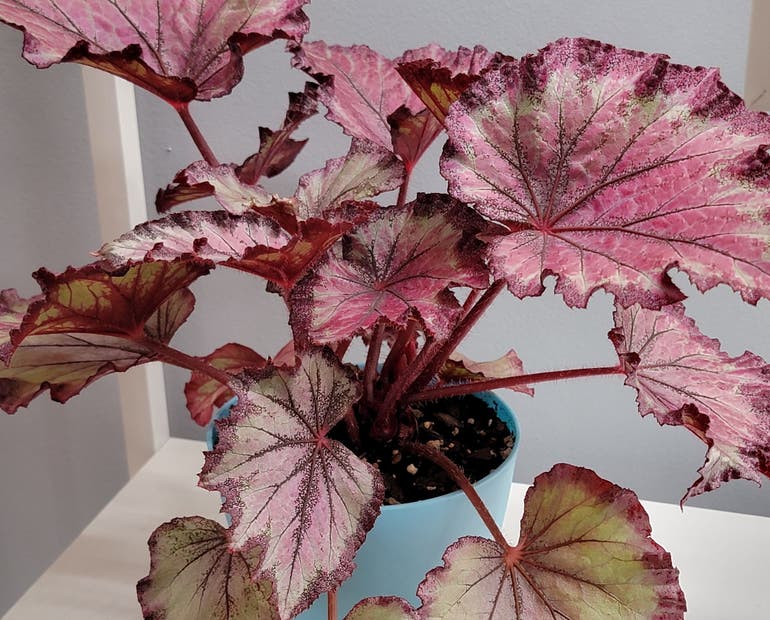No, begonias are not safe for dogs. They are toxic and can cause harm.
Dogs are curious and love to explore their surroundings. This often includes chewing on plants they find interesting. Begonias, with their colorful blooms, might seem harmless. But they can pose a serious risk to your furry friend. The plant contains substances that can cause vomiting, drooling, and difficulty swallowing in dogs.
In severe cases, it can lead to more serious health issues. Understanding the dangers of common household plants is crucial for every pet owner. This blog post will delve into why begonias are dangerous for dogs and what you can do to keep your pet safe. Stay informed to ensure your dog’s well-being.

Credit: greg.app
Introduction To Begonias
Begonias brighten gardens with their vibrant colors. Unfortunately, they are toxic to dogs if ingested. Pet owners should keep begonias out of reach to ensure their dogs stay safe.
Begonias are vibrant, eye-catching plants. They brighten any garden or home. With their unique shapes and colors, they stand out. Gardeners adore their easy maintenance and beauty. But are they safe for your furry friends?Begonia Varieties
There are many types of begonias. Some common ones include wax begonias, tuberous begonias, and rex begonias. Each type has its own charm. Wax begonias have shiny leaves and small flowers. Tuberous begonias boast large, showy blooms. Rex begonias are famous for their colorful, patterned leaves.Popularity In Home Gardens
Begonias are popular in home gardens. Their vibrant colors and varied shapes attract many gardeners. They grow well in pots and garden beds. They thrive in both indoor and outdoor settings. This versatility makes them a favorite choice for many homes. “`Toxicity Of Begonias
Begonias are popular houseplants known for their bright flowers and lush foliage. But are they safe for dogs? Unfortunately, begonias are toxic to dogs. Understanding the specific toxic compounds and symptoms can help keep your pet safe.
Toxic Compounds
Begonias contain calcium oxalates. These compounds are harmful to dogs. When ingested, they cause irritation. The irritation affects the dog’s mouth and digestive tract. The highest concentration of these compounds is in the plant’s tubers. So, keep begonias out of your dog’s reach.
Symptoms In Dogs
Signs of begonia poisoning can appear quickly. Your dog might drool excessively. Pawing at the mouth is another sign. Vomiting is common as well. The dog may also refuse to eat. Severe cases can lead to difficulty swallowing. Watch for signs of swelling in the mouth and tongue. Immediate veterinary care is crucial.
Immediate Actions If Ingested
Immediate actions should be taken if your dog ingests begonias. Begonias contain toxic substances that can harm dogs. Knowing what to do can save your pet’s life.
Recognizing Symptoms
First, recognize the symptoms of begonia poisoning. Your dog may show signs like vomiting, drooling, and diarrhea. Other symptoms include mouth irritation and difficulty swallowing. Watch for these signs to act quickly.
Contacting A Veterinarian
Second, contact a veterinarian immediately. Explain the situation and describe the symptoms. The vet will guide you on the next steps. Do not wait; quick action is crucial.

Credit: www.rover.com
Treatment Options
Begonias can be toxic to dogs if ingested. Symptoms include vomiting, drooling, and difficulty swallowing. Consult a vet for treatment options.
### Treatment Options If your dog has come into contact with begonias, you might be concerned about their health. Don’t worry, there are several treatment options available to help your furry friend feel better. Let’s explore both home remedies and professional veterinary care to ensure your pet gets the best possible treatment.Home Remedies
You can start with simple home remedies. First, remove any begonia plant material from your dog’s mouth. Rinse their mouth with water to remove any remaining plant residue. Offer them water to drink to help flush out toxins. Make sure your dog has a quiet, comfortable place to rest. Keep an eye on them for any signs of distress like vomiting or diarrhea. My dog once chewed on a begonia, and we gave him plenty of water while keeping him calm. He recovered quickly, but it was a good reminder to keep an eye on our plants.Professional Veterinary Care
If home remedies don’t seem to work, or if your dog’s symptoms worsen, it’s time to seek professional veterinary care. A vet can provide treatments like activated charcoal to absorb toxins. They might also administer intravenous fluids to keep your pet hydrated. In severe cases, the vet may need to perform blood tests or other diagnostic procedures. Your vet will guide you through the necessary steps to ensure your dog’s full recovery. You should never hesitate to consult a professional if you’re unsure about your dog’s condition. Remember, your dog’s health is a top priority. Have you ever had a close call with your pet and toxic plants? How did you handle it? Share your experiences in the comments below! By taking prompt action, you can help your dog recover quickly and prevent future incidents. Keeping an eye on your garden and houseplants can make a big difference in ensuring your furry friend’s safety.Preventing Begonia Poisoning
Begonias can be toxic to dogs if ingested. Keep these plants out of reach to prevent poisoning. Ensure your home is pet-safe.
Preventing Begonia Poisoning Begonias are beautiful, but they can be harmful to your furry friends. Dogs are curious creatures and sometimes taste things they shouldn’t. If you have begonias at home, it’s crucial to take steps to prevent begonia poisoning.Safe Plant Placement
Placing your begonias in safe spots is your first line of defense. Keep them on high shelves or hang them in baskets out of reach of your dog. This simple measure can drastically reduce the risk of accidental ingestion. Think about areas your dog frequents the most. Avoid putting begonias in those spots. For example, your living room or garden might need to be begonia-free zones. Outdoor begonias should be in fenced areas or raised garden beds. This way, your dog can’t easily access them during their outdoor playtime.Training Your Dog
Training your dog can also help prevent begonia poisoning. Teach them commands like “leave it” or “no.” These commands can stop your dog from eating something harmful. Positive reinforcement works wonders. Reward your dog with treats and praise when they obey commands. This encourages good behavior. Consistency is key. Make sure everyone in the household uses the same commands and techniques. This helps your dog understand what’s expected of them. Have you ever caught your dog chewing on a plant? How did you handle it? Share your experiences and tips in the comments below. Your insights could help other dog owners keep their pets safe. Preventing begonia poisoning is all about being proactive. Safe plant placement and effective training are practical steps you can take today. Keep your dog safe and enjoy your beautiful begonias without worry.
Credit: www.pawsdogdaycare.com
Alternative Pet-safe Plants
Are you worried about the safety of your pets around begonias? It’s essential to know that begonias can be toxic to dogs. Fortunately, there are many pet-safe plant alternatives that can keep your home and garden green without posing a danger to your furry friends. Let’s explore some non-toxic houseplants and dog-friendly outdoor plants that you can safely incorporate into your living spaces.
Non-toxic Houseplants
When selecting houseplants, opt for varieties that are safe for dogs. Spider plants are an excellent choice. They have long, thin leaves and are easy to care for. They also purify the air.
Pilea, also known as the friendship plant, is another safe option. Its round, coin-shaped leaves add a unique touch to your home. They thrive in bright, indirect light.
Boston ferns are perfect if you prefer lush greenery. They are non-toxic and add a touch of elegance to any room. They need high humidity and indirect light.
Dog-friendly Outdoor Plants
For outdoor spaces, consider planting marigolds. These vibrant flowers are non-toxic to dogs and add color to your garden. They are easy to grow and repel pests.
Snapdragons are another safe option for dogs. Their tall, colorful blooms can brighten any garden. They thrive in full sun and well-drained soil.
Lavender is a great choice for a pet-safe garden. Its fragrant purple flowers are safe for dogs. It also attracts beneficial insects like bees and butterflies. Lavender prefers full sun and dry soil.
Educating Pet Owners
Understanding the safety of begonias for dogs is essential for pet owners. Begonias can be toxic to dogs if ingested. Protect pets by keeping these plants out of their reach.
### Educating Pet Owners As a pet owner, your furry friend’s safety is your top priority. Understanding which plants can harm your dog is essential. Begonias, while beautiful, are toxic to dogs. Educating yourself and others can prevent accidents. ###Awareness Campaigns
Awareness campaigns can be powerful. They inform pet owners about the dangers of toxic plants like begonias. Local animal shelters often run these campaigns. They use social media and flyers to spread the word. Engaging in these initiatives can help protect pets in your community. You can also start your own mini-campaign. Share information with friends and family. Use your social media to educate a wider audience. ###Resources For Pet Safety
There are many resources available to ensure pet safety. Websites like the ASPCA provide lists of toxic plants. Bookmark these pages for quick reference. Pet safety apps can also be handy. They offer real-time information on harmful substances. Download one to keep vital information at your fingertips. Veterinarians are invaluable resources. They can offer advice and answer questions about plant safety. Don’t hesitate to ask during your next visit. Using these resources can make you a more informed pet owner. Your dog’s safety is worth the effort.Frequently Asked Questions
What Happens If A Dog Eats A Begonia?
A dog eating a begonia may experience vomiting, drooling, and difficulty swallowing. Begonias are toxic to dogs. Seek veterinary help immediately.
Do Dogs Like Begonias?
Dogs typically do not like begonias. These plants can be toxic if ingested, causing discomfort or illness in dogs. Keep begonias out of reach.
Do Begonias Like Sun Or Shade?
Begonias prefer partial shade but can tolerate morning sun. Avoid intense afternoon sun to prevent leaf burn.
Are Begonia Petals Poisonous?
Yes, begonia petals are mildly toxic to pets and humans. Consuming them can cause vomiting and irritation.
Conclusion
Begonias can be harmful to dogs if ingested. Pet owners should stay cautious. Ensure your garden is safe for your furry friends. Choose non-toxic plants instead. Research before adding new plants at home. Keep an eye on your pets around unfamiliar greenery.
Their health and safety come first. Stay informed and create a pet-friendly environment. Your dog’s well-being depends on your choices.